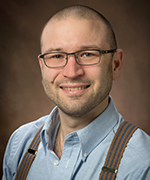
- visiting assistant professor in the Department of Philosophy
- MA in Philosophy, Miami University
- PhD in Philosophy, Penn State
- spent 2 years with AmerCorps post-undergrad
- teaches Society and the Individual and Confronting Death
Background
"I grew up in Roseville, Minnesota, near St. Paul and did my undergraduate degree in philosophy at Grinnell College in Iowa. I later came to Miami to do a masters, also in philosophy, and I followed that with a PhD in philosophy at Penn State.
"I went into college initially wanting to study psychology, but I ended up finding myself drawn towards philosophy because it had to do with the study of first principles. In every college class I took, I found myself wondering about the underlying justifications for that discipline's basic categories and principles. When I took my first philosophy class, and was introduced to metaphysics and epistemology, I realized that I had found my place!
"After undergrad I joined AmeriCorps, spending two years out in Seattle. The first year I was a literacy tutor in elementary school, and for my second year I was removing invasive Himalayan blackberries in public parks. They were these giant, 15-feet tall thorny hedges that looked like they came out of The Lord of the Rings — it was really fun! When you finally get the root ball out, it's so satisfying."
Teaching
"During the fall I've been teaching two sections on Society and the Individual, and I'm also teaching a section of Confronting Death. I specialize in phenomenology, ethical theory, applied ethics, and critical thinking. It's always really interesting to have one-on-one conversations with students, having a dialogue and seeing why people believe what they do, and for that same reason I love papers. I'm genuinely fascinated in what my students believe and how they have come to them. My main focus in all of my classes is helping students express themselves more clearly to defend their positions better.
"My teaching goal is to help students think through philosophical concepts for themselves. I don't view it as really transmitting knowledge per se; it's fairly pointless to sit there and try to memorize what a bunch of dead people thought on various issues. People will arrive at these ideas for themselves. That's the thing that I love about philosophy — it's a conversation that's been going on for thousands of years!
"And unlike the sciences, the results really never go obsolete because philosophy is not about dealing with empirical facts. Students will go through the same thought process that Plato went through, and then they'll be able to own the idea for themselves. Even if in 20 years they don't remember the specifics of a particular dialogue or concept, they'll still have that new way of thinking that they can use in all areas of their lives — that's how I'll know if I've succeeded.
"Ultimately, you don't really know what you think until you've gone through a reasoning process and arrived at the idea for yourself. Just having a bunch of opinions is fine, but you need to discover their grounds in order to really own your own mind."
Research
"My research is a combination of ethics and phenomenology, which is usually defined as the study of first-person experience. My dissertation is on free will and embodiment, trying to figure out how scientific descriptions of how the body functions relate to the possibility of free choice.
"Not a whole lot of participants are in my research quite yet. At least one of our current master's students will be sitting in on one of my undergraduate courses next semester, but I'm not involving a lot of participants in my research just yet. During my own time as a master's student at Miami, I helped the current philosophy chair, Elaine Miller, with her book's footnotes."
Outside the Classroom
"Whenever I am between classes, my main recreation is fossil hunting around campus. I love to just wander off in those woods and trail systems around Miami's Oxford campus.
"Lately I've been getting into some minor woodwork, and I also restore antique lamps. At one time I had hoped to do it as a career, but shockingly, antique lamp repair is just not a great career path at the moment! The biggest antique lamp repair store in Minnesota's Twin Cities, which shut down a couple of years ago, was great because I got to go to the basement and grab a bunch of parts. The trick of it is that the parts are mass-produced, but they're not produced anymore, so either you need to find this brass thing from the 1940s, or fabricate it somehow."
[December 2019]
 Miami University Oxford, Ohio est. 1809
College of Arts and Science
Miami University Oxford, Ohio est. 1809
College of Arts and Science
 Miami University Oxford, Ohio est. 1809
College of Arts and Science
Miami University Oxford, Ohio est. 1809
College of Arts and Science